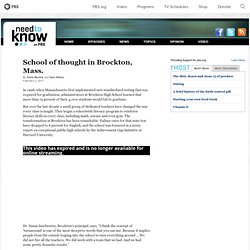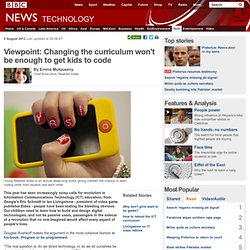

Video: School of thought in Brockton, Mass. In 1998, when Massachusetts first implemented new standardized testing that was required for graduation, administrators at Brockton High School learned that more than 75 percent of their 4,000 students would fail to graduate.

But over the last decade a small group of dedicated teachers have changed the way every class is taught. They began a schoolwide literacy program to reinforce literacy skills in every class, including math, science and even gym. The transformation at Brockton has been remarkable: Failure rates for that state test have dropped to 6 percent for English, and the school was featured in a 2009 report on exceptional public high schools by the Achievement Gap Initiative at Harvard University. Dr. Susan Szachowicz, Brockton’s principal, says, “I think the concept of ‘turnaround’ is one of the most deceptive words that you can use. Related: Brockton’s retired teachers devise a script for success. Eight problems with Common Core Standards - The Answer Sheet.
Correction: The original post said incorrectly that the Common Core was written with no public dialogue or feedback from experienced educators.

The post now says there was insufficient public dialogue and feedback from experienced educators. This was written by Marion Brady, veteran teacher, administrator, curriculum designer and author. By Marion Brady E.D. Hirsch, Jr.’s book, “Cultural Literacy: What Every American Needs to Know,” was published March 1, 1987. So it was probably in March of that year when, sitting at a dining room table in an apartment on Manhattan’s Upper East Side, my host — a Third grade teachers learn how to teach common core mathematics in Tennessee.
I don’t remember what I said, but it was probably some version of what I’ve long taken for granted: Most people think that whatever they and the people they like happen to know, everybody else should be required to know. It’s a bad idea. Two: The world changes. Five: The Common Core kills innovation. “Why a whole week?” Critical & Creative Education. How can we still say no to tech in classrooms? Why aren’t all teachers embracing technology?

Why are some jumping in with both feet, some paddling around in the kiddie pool, and some well back of the water? Come on in! The water's fine! Is it stubborness? Fear? Some teachers question why it may be more beneficial to students to use GoogleDocs to write an essay than it is to do it on a word processor at home and submit it? Here are my thoughts on why the use of technology and social media is often limited, and why it’s use in the classroom is essential: 1. 2. 3. 4. Is this just a problem only teachers face? So, as educational leaders, how do we help to change this? Administrators need to model online and digital teaching/learning techniques in our interactions with teachers – our staff meetings must include digital learning and sharing of successes. As principals and leaders, are we ready to do that? I’m not asking everyone to dive into the deep end right now.
Viewpoint: Changing the curriculum won't be enough to get kids to code. 5 August 2012Last updated at 20:06 ET By Emma Mulqueeny Chief Executive, Rewired State Young Rewired State is an annual week-long event giving children the chance to learn coding skills from experts and each other This year has seen increasingly noisy calls for revolution in Information Communications Technology (ICT) education, from Google's Eric Schmidt to Ian Livingstone - president of video game publisher Eidos - people have been stating the bleeding obvious: Our children need to learn how to build and design digital technologies, and not be passive users, passengers in the sidecar of a revolution that no one imagined would affect every aspect of people's lives.

Douglas Rushkoff makes the argument in the most cohesive fashion in his book: Program or be programmed. "The real question is, do we direct technology, or do we let ourselves be directed by it and those who have mastered it? " "'Choose the former, and you gain access to the control panel of civilization. Wrong problem No.